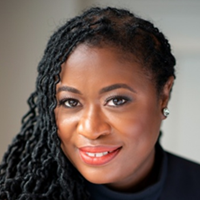 Anita Fernander will be the inaugural chief officer for justice, equity, diversity, and inclusion at the Schmidt College of Medicine of Florida Atlantic University, effective June 7, 2021. Dr. Fernander currently serves as the health equity thread leader for medical education, the diversity, equity, and inclusion director in the department of behavioral science, and an associate professor in the College of Medicine at the University of Kentucky.
Anita Fernander will be the inaugural chief officer for justice, equity, diversity, and inclusion at the Schmidt College of Medicine of Florida Atlantic University, effective June 7, 2021. Dr. Fernander currently serves as the health equity thread leader for medical education, the diversity, equity, and inclusion director in the department of behavioral science, and an associate professor in the College of Medicine at the University of Kentucky.
Dr. Fernander is a graduate of Oakwood University in Huntsville, Alabama, where she majored in physical education and psychology. She received a master’s degree and a Ph.D. in clinical health psychology from the University of Miami.
 Patrick Dunkley will serve as vice provost for institutional equity, access, and community at Stanford University. He will also direct the Office of Institutional Equity and Access. He currently serves as deputy athletics director and senior university counsel.
Patrick Dunkley will serve as vice provost for institutional equity, access, and community at Stanford University. He will also direct the Office of Institutional Equity and Access. He currently serves as deputy athletics director and senior university counsel.
Dunkley is a graduate of San Jose State University, where he majored in accounting. He holds a law degree from Santa Clara University.
 Andrea Abrams has been promoted to vice president for diversity, inclusion, and equity at Centre College in Danville, Kentucky. For the past three years, she has served as chief diversity officer at the college. Dr. Abrams joined the faculty at the college in 2009 as an assistant professor of anthropology. She is the author of God and Blackness: Race, Gender, and Identity in a Middle-Class Afrocentric Church (New York University Press, 2014).
Andrea Abrams has been promoted to vice president for diversity, inclusion, and equity at Centre College in Danville, Kentucky. For the past three years, she has served as chief diversity officer at the college. Dr. Abrams joined the faculty at the college in 2009 as an assistant professor of anthropology. She is the author of God and Blackness: Race, Gender, and Identity in a Middle-Class Afrocentric Church (New York University Press, 2014).
A graduate of Agnes Scott College in Decatur, Georgia, Dr. Abrams went on to earn a master’s degree and a Ph.D. in anthropology from Emory University in Atlanta.
 Amber Benton was appointed assistant dean for diversity, equity, and inclusion for the College of Natural Science at Michigan State University. She has been serving as director of diversity programming and student engagement for James Madison College at the university.
Amber Benton was appointed assistant dean for diversity, equity, and inclusion for the College of Natural Science at Michigan State University. She has been serving as director of diversity programming and student engagement for James Madison College at the university.
Dr. Benton received her bachelor’s degree in Spanish from Pacific University in Forest Grove, Oregon. She earned a master’s degree in higher education leadership from the University of Nevada, Las Vegas, and a doctorate in higher adult and lifelong education from Michigan State University.
 Gretchen Cook-Anderson was named associate vice president and assistant to the president for diversity, equity, inclusion, and antiracism at IES Abroad. She joined IES Abroad in 2011 as the director of diversity recruiting. Founded in 1950, IES Abroad is a global, not-for-profit academic consortium of more than 500 top-tier American colleges and universities that provides premier study abroad and internship programs around the world.
Gretchen Cook-Anderson was named associate vice president and assistant to the president for diversity, equity, inclusion, and antiracism at IES Abroad. She joined IES Abroad in 2011 as the director of diversity recruiting. Founded in 1950, IES Abroad is a global, not-for-profit academic consortium of more than 500 top-tier American colleges and universities that provides premier study abroad and internship programs around the world.
Cook-Anderson holds a bachelor’s degree from Spelman College in Atlanta and a master’s degree in international economics from Johns Hopkins University in Baltimore.












